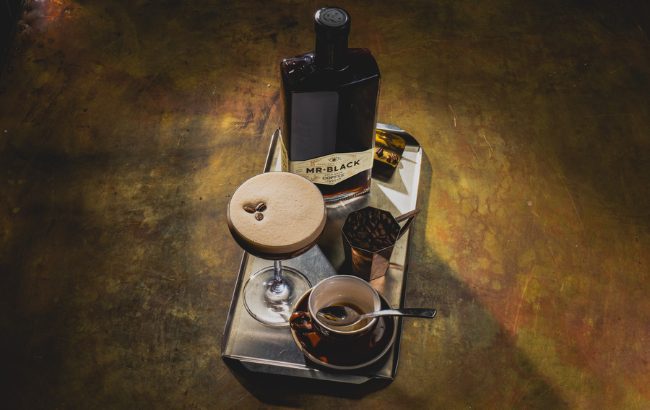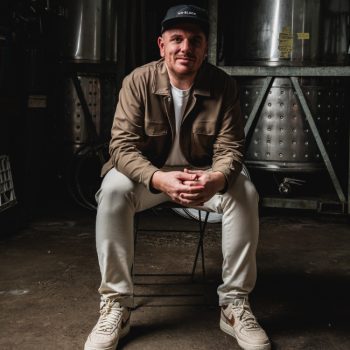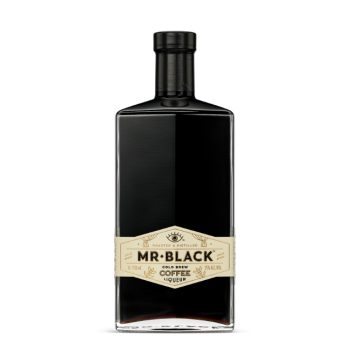How Diageo and Tom Baker took Mr Black global
By Rupert HohwielerTom Baker, co-founder of Australian coffee liqueur Mr Black, reflects on the brand’s strategy and success, more than a decade after Diageo came calling.

“Coffee is part of our national identity,” Tom Baker says of how the concept for Mr Black came alive. “It’s who we are. My high school had a barista. If you think it’s a dumb idea to give 12-year-olds espresso: it is, but we did it anyway. That’s part of who we are as Australians and is fundamental as to why our brand has an appeal in Australia. It’s what makes Mr Black, Mr Black.”
The brand led the global coffee liqueur category by volume from 2017 to 2021, according to IWSR data, just as the Espresso Martini began to take off. This culminated in Baker selling the brand to Diageo in September 2022 for an undisclosed sum. He remains actively involved in the business, working closely with Diageo.
“I think Mr Black in itself is an innovation,” he says. “We worked out quickly that we weren’t just going to be another Australian spirit. We’ve got lots of them, who cares? We needed to make Mr Black stand for something bigger.”
That meant coffee became the central idea for the brand. “That was a transformational shift in perspective that allowed the business to win at home,” Baker continues. “We’ve made a brand that people love and hundreds of thousands bought into in Australia, and also, made it globally resonate where others have failed.”
Australian spirits producers are currently in a challenging period, thanks to the country’s biannual tax hikes. Reflecting on whether he might have done anything differently if he started the brand today, rather than back in 2013, Baker says: “Maybe an understanding that Australia can’t be our home market and we need to develop an export business – maybe, maybe, maybe.”

There are too many maybes to consider, but with coffee being one of the world’s most consumed beverages, Baker feels Mr Black has a timeless component.
“A lot of the things that drove growth for us in the early years wouldn’t work now. Maybe Mr Black was at the right time,” he says. “I don’t want to pick on categories, but rhubarb gin was one of these things that had a moment and then disappeared. That’s the magic of coffee: it’s been around for over a millennium, and we’ve been drinking it for something like 1,600 years globally.
“My point is: if another brand started today, they would do it differently. Ten years ago, cocktail culture wasn’t where it is today. Maybe that could set [new brands] up better for the future – they build full-strength spirits or something lower [in] ABV to deal with excise.
“I also emphatically believe Mr Black still tastes as good as it does. If I introduced that 10 years earlier or 10 years later, people would still like it just as much.”
Thinking in niches
Diageo first invested in Mr Black through its Distill Ventures incubator programme in 2015, buying a minority stake, before going all in in 2022. Since the acquisition, Baker notes the brand has done “incredibly”.
“We’re as Diageo as Johnnie Walker and Guinness are – you know, in the tent. That doesn’t mean we’re immune to the challenges of buying and integrating brands. You see that across the suppliers, I find it a difficult process. But it’s certainly been a success story.”
Volume-wise, the US is Mr Black’s biggest market, with Australia in second place. In the UK, the brand is stocked in Waitrose supermarkets, where it does “really well”, says Baker, otherwise it’s only available online. In Europe, Belgium and Germany are strong markets, but Baker contends that “we don’t really think of it in terms of countries”.
“We think of it in terms of niches,” he says. “With Mr Black, we like to think of ourselves as one of the most respected coffee liqueurs in the bar industry – quality credentials, a decade in the trade, and bartenders love us. Those bars are in more than one country.” Specifically, he sees a lot of those bars in Australia and the US, as well as in Singapore, Hong Kong, Bangkok, Tokyo, Berlin and Barcelona. “There’s a collective of bars that we want to be in, and they just happen to be regionally quite diverse.”

He explains that in the Baltics, the brand might only be in 30 bars. “But they’re the 30 bars we want to be,” he says. “I don’t want to be in 3,000 bars there, if you get my point. We target the niche of bars that love what we make, as opposed to ‘owning’ a country.”
In terms of new products, Mr Black has previously collaborated with other Australian spirits that share Diageo ties, like a coconut-flavoured bottling with Bundaberg rum and a limited edition whisky and coffee-based liqueur with Starward.
As for more, Baker asserts: “Genuinely no – it’s one thing done well. The more we focus, the faster we’ve grown. There’s nothing on the horizon, no RTDs, new sizes, nothing.”
He’s aiming to mimic the approach taken by Tito’s Handmade Vodka, which is the biggest-selling vodka in the US but offers just a single product. “Think about the temptation for them to do a flavoured vodka as that market was blowing up,” he ponders. “I think there’s real success from discipline.”
Recently, Baker also spoke to The Spirits Business about Australia’s spirits environment.
He believes a national trade body for the sector “can’t happen fast enough”. “It will unlock more than AU$1 billion for the economy, and it would be such a transformational thing to have that taxation treatment. It would ultimately boil down for Mr Black to [be able to] thrive overseas as a healthier Australian business.
“We can’t expect everyone to have to export their product to succeed. They can’t afford to export it unless they have a profitable local business.
“Success starts at home, and while Australians are still shackled with exorbitant tax rates on spirits, which will inhibit demand for spirits, then we won’t be able to export. That’s at all levels, not just craft producers, but for the big guys as well.”
Related news
Desi Daru features at Sushisamba
